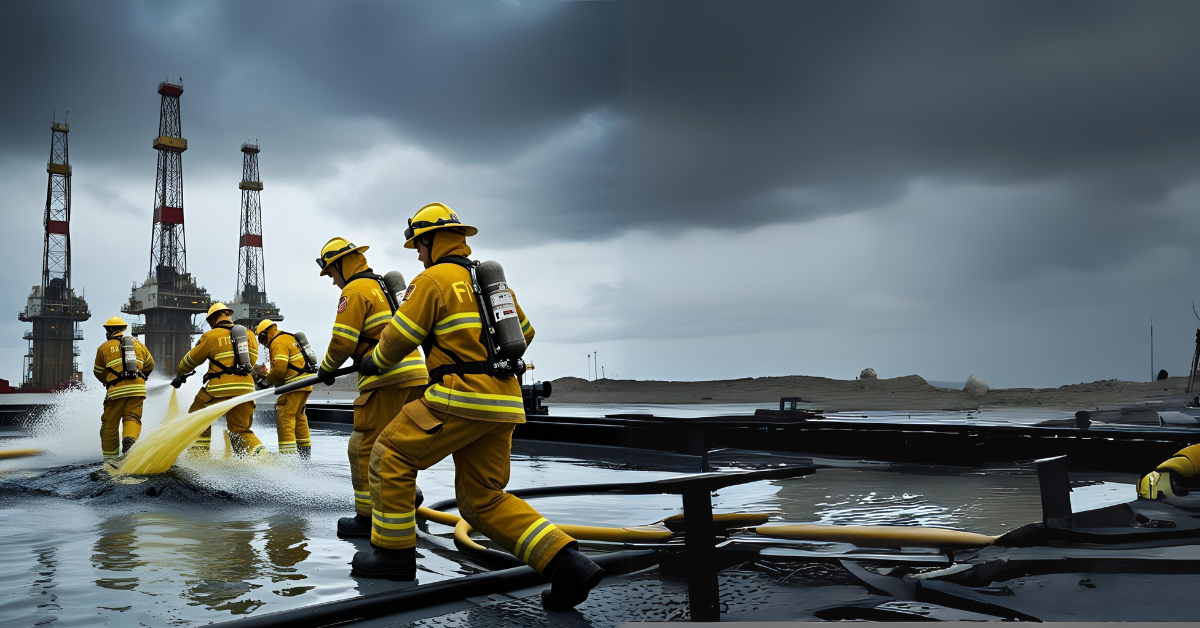Intermediate

Level 3 Certificate in Industrial Emergency Response (Oil & Gas / High-Risk Sites)
Level 3 Certificate in Industrial Emergency Response (Oil & Gas / High-Risk Sites)Course OverviewThe Level 3 Certificate in Industrial Emergency Response (Oil & Gas / High-Risk Sites) is designed for professionals working in high-risk industries such as oil and gas, chemical processing, and other hazardous environments. This qualification equips learners with the knowledge and practical skills needed to respond to emergencies effectively in industrial settings. The course covers emergency response planning, safety protocols, and crisis management techniques specific to high-risk sites. It is ideal for those involved in emergency response teams, health and safety roles, and site management within hazardous industries.Benefits
Who is This Designed For?This certificate is ideal for:
- Gain specialized knowledge in responding to industrial emergencies, including fire, chemical spills, and gas leaks.
- Learn to develop and implement emergency response plans specific to high-risk environments.
- Understand safety protocols, risk assessments, and incident command systems in industrial settings.
- Build practical skills in leading emergency response teams and managing resources during high-risk incidents.
- Improve career prospects in the oil, gas, chemical, and other high-risk sectors.
- Identify and assess risks specific to oil, gas, and high-risk industrial sites.
- Implement emergency response protocols and safety measures tailored to hazardous environments.
- Develop and manage emergency response plans and teams in industrial settings.
- Lead emergency response efforts during incidents, including fire outbreaks, chemical spills, and equipment malfunctions.
- Communicate effectively with internal and external stakeholders during emergencies.
- Conduct post-incident evaluations to improve emergency response procedures.
- Introduction to Industrial Emergency Response
- Understanding industrial emergency response: characteristics, challenges, and high-risk industries.
- Types of emergencies in industrial environments: fires, explosions, chemical spills, toxic gas leaks, and environmental hazards.
- The role of emergency response teams (ERT) in oil, gas, and high-risk sites.
- Key principles of emergency response: preparedness, prevention, mitigation, response, and recovery.
- Risk Assessment and Hazard Identification
- Conducting risk assessments specific to high-risk environments such as oil rigs, chemical plants, and refineries.
- Identifying potential hazards: fire, explosion, toxic chemical exposure, environmental damage, and structural failures.
- Quantifying risk levels and assessing the likelihood and consequences of various incidents.
- Implementing risk control measures: engineering controls, administrative measures, and personal protective equipment (PPE).
- Developing Emergency Response Plans for High-Risk Sites
- Key components of an emergency response plan (ERP) for industrial settings.
- Specific emergency response strategies for oil and gas facilities: fire response, gas leak detection, chemical spill management.
- Emergency evacuation procedures: planning escape routes, assembly points, and personnel accounting.
- Coordination with external agencies: local authorities, fire departments, medical services, and environmental protection agencies.
- Incident Command Systems (ICS) for Industrial Emergencies
- Understanding the Incident Command System (ICS): structure, roles, and responsibilities in industrial emergencies.
- Integration of ICS with organizational safety and emergency response protocols.
- Managing incidents: establishing command, delegating roles, and making quick decisions under pressure.
- Communication during incidents: incident reporting, maintaining clear communication, and managing internal and external messages.
- Fire Safety and Hazardous Material Handling
- Industrial fire safety protocols: preventing fires, fire suppression systems, and responding to fire outbreaks.
- Managing hazardous materials: safe handling, storage, and disposal of toxic substances.
- Responding to chemical spills and gas leaks: containment, mitigation, and emergency clean-up.
- Use of specialized firefighting equipment and PPE in hazardous environments.
- Health and Safety Protocols in High-Risk Industries
- Occupational health and safety standards in the oil, gas, and chemical industries.
- The role of safety audits, inspections, and drills in maintaining readiness.
- Worker health during emergencies: first aid, triage, and treatment for injuries and exposure.
- Managing psychological effects: stress management and support for emergency responders.
- Communication and Coordination in Emergency Response
- The importance of communication in high-risk industrial emergencies: internal communication within the response team and external communication with authorities.
- Managing stakeholder relationships during an incident: working with regulatory agencies, media, and affected communities.
- Crisis communication strategies: managing public relations, addressing concerns, and providing timely information.
- Documentation and reporting: incident logs, after-action reports, and compliance with regulatory standards.
- Post-Incident Evaluation and Continuous Improvement
- Conducting post-incident reviews and debriefs: evaluating the effectiveness of the emergency response.
- Identifying lessons learned: areas for improvement in response plans, team coordination, and resource management.
- Implementing changes to emergency response plans based on feedback and analysis.
- Building a culture of continuous improvement: training, drills, and revising procedures.
| Unit Title | GLH | TQT | Credit | Assessment Type |
| Introduction to Industrial Emergency Response | 8 | 16 | 1.5 | MCQ-based |
| Risk Assessment and Hazard Identification | 10 | 20 | 2 | MCQ-based |
| Developing Emergency Response Plans for High-Risk Sites | 12 | 24 | 2.5 | MCQ-based |
| Incident Command Systems (ICS) for Industrial Emergencies | 10 | 20 | 2 | MCQ-based |
| Fire Safety and Hazardous Material Handling | 12 | 24 | 2.5 | MCQ-based |
| Health and Safety Protocols in High-Risk Industries | 10 | 20 | 2 | MCQ-based |
| Communication and Coordination in Emergency Response | 10 | 20 | 2 | MCQ-based |
| Post-Incident Evaluation and Continuous Improvement | 8 | 16 | 1.5 | MCQ-based |
- Emergency responders, safety officers, and risk managers working in oil, gas, and chemical industries.
- Personnel involved in health and safety, environmental protection, and crisis management in high-risk industrial settings.
- Managers, supervisors, and team leaders responsible for emergency preparedness and response at industrial sites.
- Professionals seeking to enhance their qualifications in emergency response, industrial safety, and risk management.
- Pursue roles such as Emergency Response Coordinator, Health and Safety Officer, Risk Manager, or Crisis Manager in oil, gas, and industrial sectors.
- Enhance career opportunities in other high-risk environments like chemical manufacturing, power plants, or mining operations.
- Progress to advanced certifications in industrial safety, environmental management, or disaster recovery.
- Move into leadership roles in safety management, emergency planning, or business continuity.
- Expert-Led Learning: Learn from instructors with real-world experience in industrial emergency response and safety.
- Practical, Hands-On Approach: Gain practical skills through case studies, simulations, and emergency response drills.
- Industry-Relevant Training: Develop specialized knowledge relevant to high-risk industries such as oil, gas, and chemical manufacturing.
- Global Recognition: The qualification is respected across the industry, enhancing your professional credibility and career prospects.
Qualification Profile
Qualification Title: Level 3 Certificate in Industrial Emergency Response (Oil & Gas / High-Risk Sites)
Level: 3
Type: Certificate
Total Qualification Time (TQT): 160 hours
Guided Learning Hours (GLH): 80 hours
Credit Value: 16 credits
Assessment Method: MCQ-based
Grading: Pass/Fail
Delivery Mode: Classroom / Online / Blended
Study Units Breakdown
| Unit Title | GLH | TQT | Credit | Assessment Type |
| Introduction to Industrial Emergency Response | 8 | 16 | 1.5 | MCQ-based |
| Risk Assessment and Hazard Identification | 10 | 20 | 2 | MCQ-based |
| Developing Emergency Response Plans for High-Risk Sites | 12 | 24 | 2.5 | MCQ-based |
| Incident Command Systems (ICS) for Industrial Emergencies | 10 | 20 | 2 | MCQ-based |
| Fire Safety and Hazardous Material Handling | 12 | 24 | 2.5 | MCQ-based |
| Health and Safety Protocols in High-Risk Industries | 10 | 20 | 2 | MCQ-based |
| Communication and Coordination in Emergency Response | 10 | 20 | 2 | MCQ-based |
| Post-Incident Evaluation and Continuous Improvement | 8 | 16 | 1.5 | MCQ-based |
Upon completing this certificate, learners will be able to:
- Identify and assess risks specific to oil, gas, and high-risk industrial sites.
- Implement emergency response protocols and safety measures tailored to hazardous environments.
- Develop and manage emergency response plans and teams in industrial settings.
- Lead emergency response efforts during incidents, including fire outbreaks, chemical spills, and equipment malfunctions.
- Communicate effectively with internal and external stakeholders during emergencies.
- Conduct post-incident evaluations to improve emergency response procedures.
This certificate is ideal for:
- Emergency responders, safety officers, and risk managers working in oil, gas, and chemical industries.
- Personnel involved in health and safety, environmental protection, and crisis management in high-risk industrial settings.
- Managers, supervisors, and team leaders responsible for emergency preparedness and response at industrial sites.
- Professionals seeking to enhance their qualifications in emergency response, industrial safety, and risk management.
Assessment Type: MCQ-based
Top Courses
Related Courses
Let's Get in touch
Deleting Course Review
Are you sure? You can't restore this back
Course Access
This course is password protected. To access it please enter your password below:



